北师大版必修5同步教学课件:Unit 13 People Section Ⅳ Grammar & Writing课件
文档属性
| 名称 | 北师大版必修5同步教学课件:Unit 13 People Section Ⅳ Grammar & Writing课件 |

|
|
| 格式 | zip | ||
| 文件大小 | 603.6KB | ||
| 资源类型 | 教案 | ||
| 版本资源 | 北师大版 | ||
| 科目 | 英语 | ||
| 更新时间 | 2016-12-27 00:00:00 | ||
图片预览

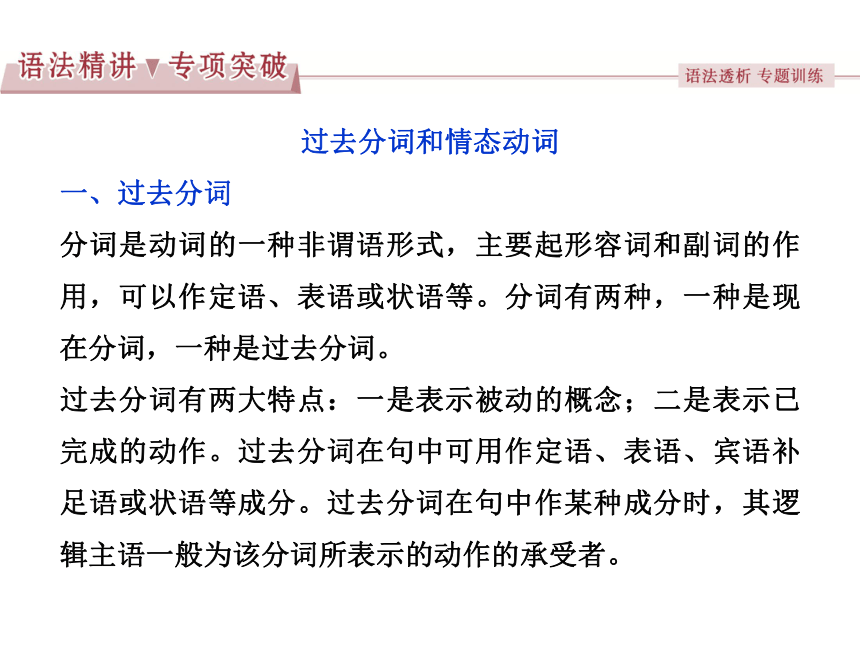
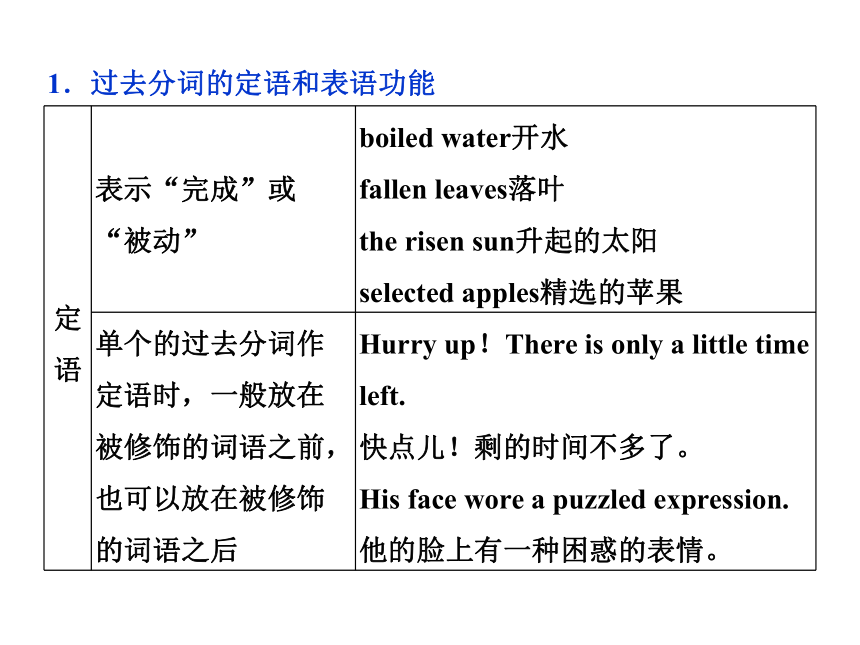

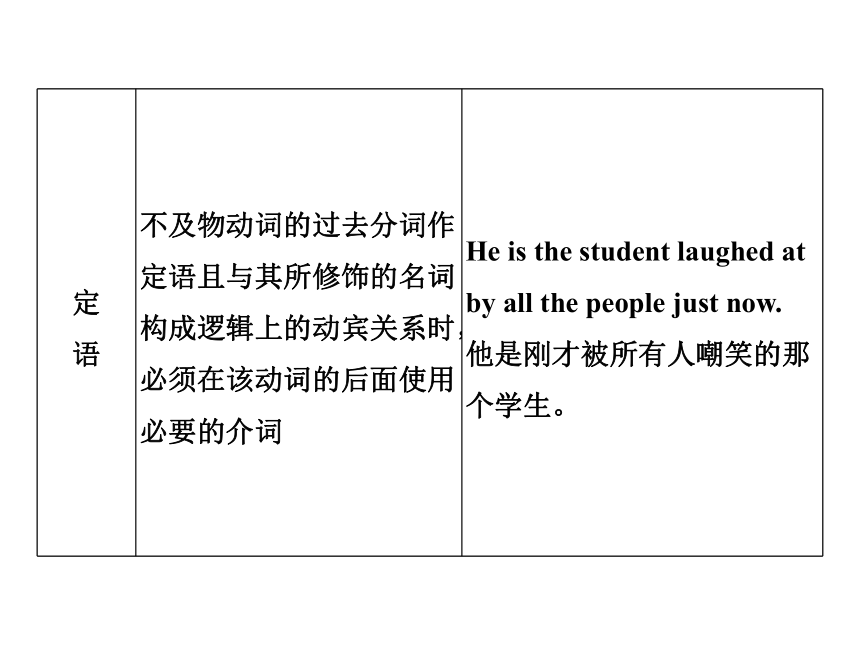
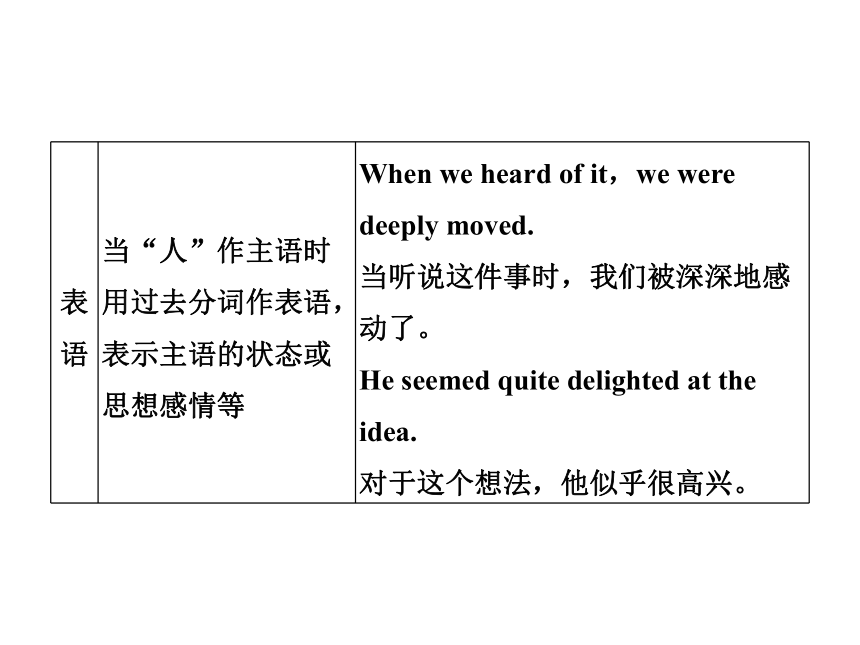
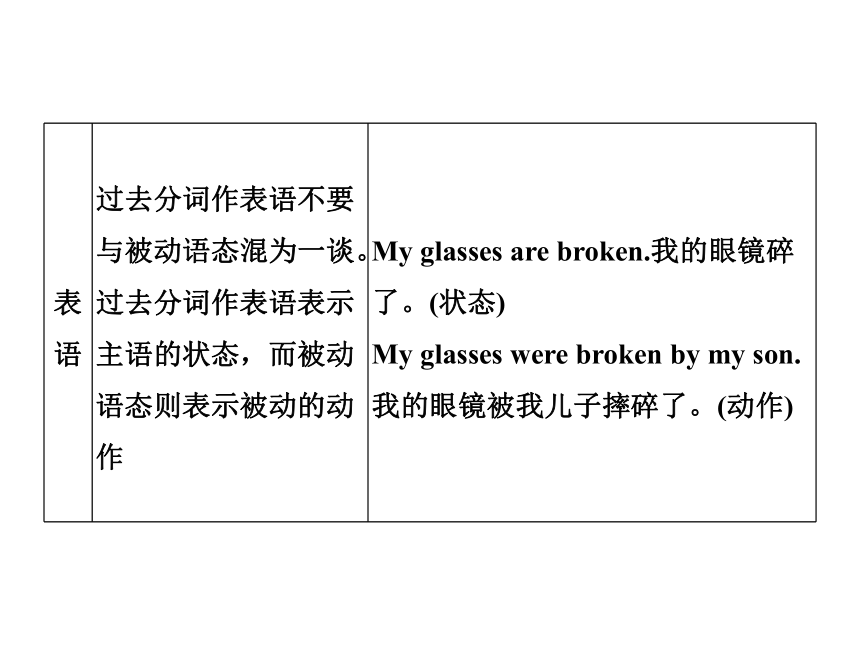
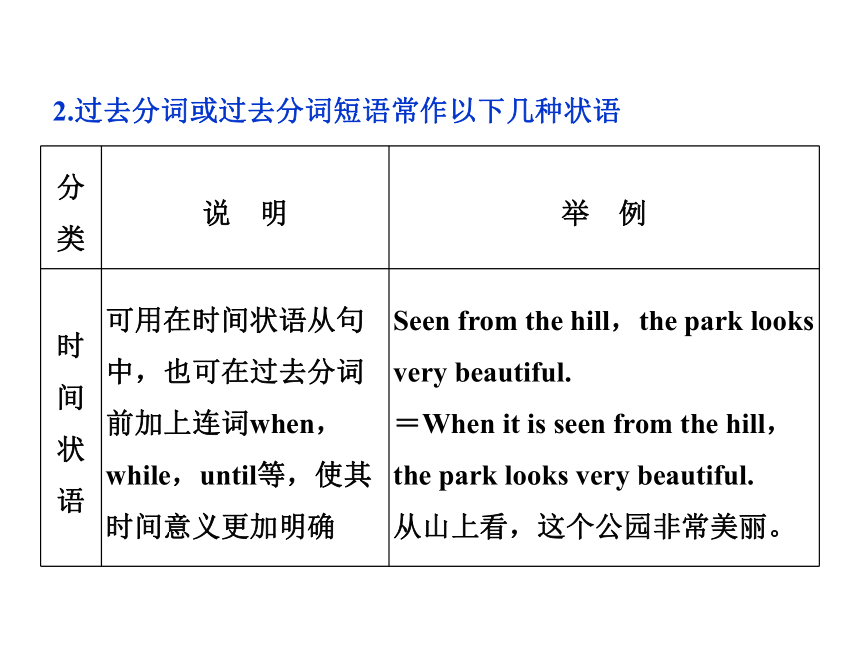
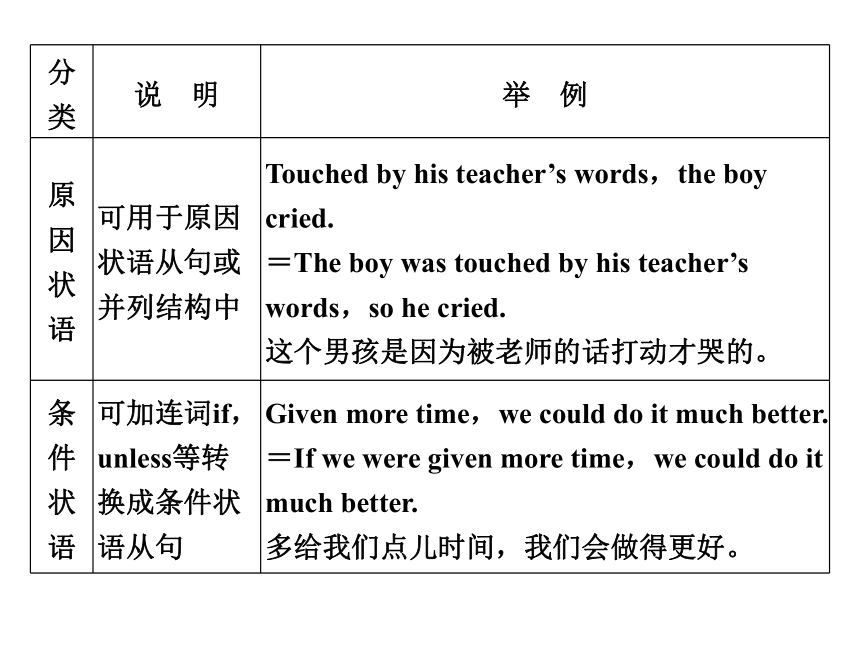
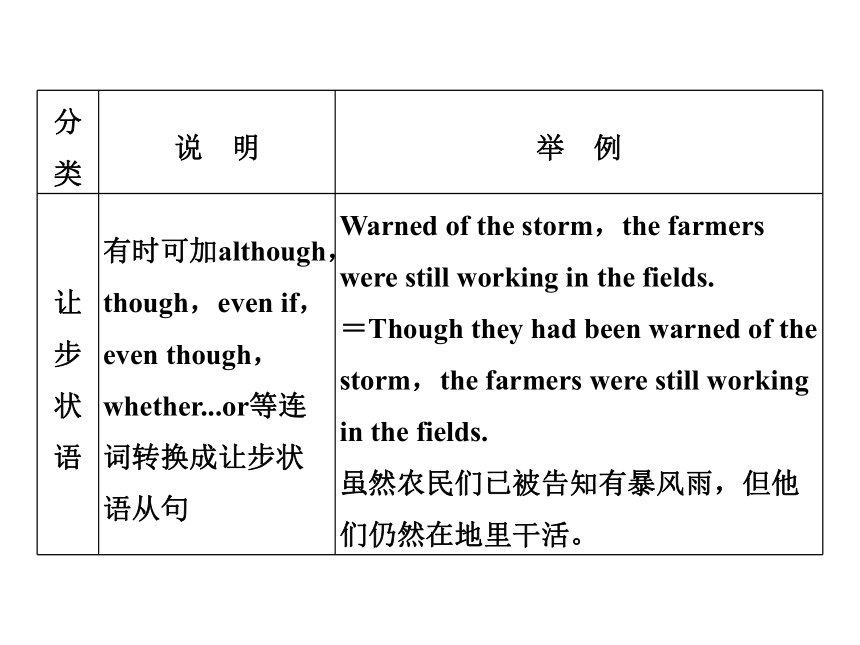
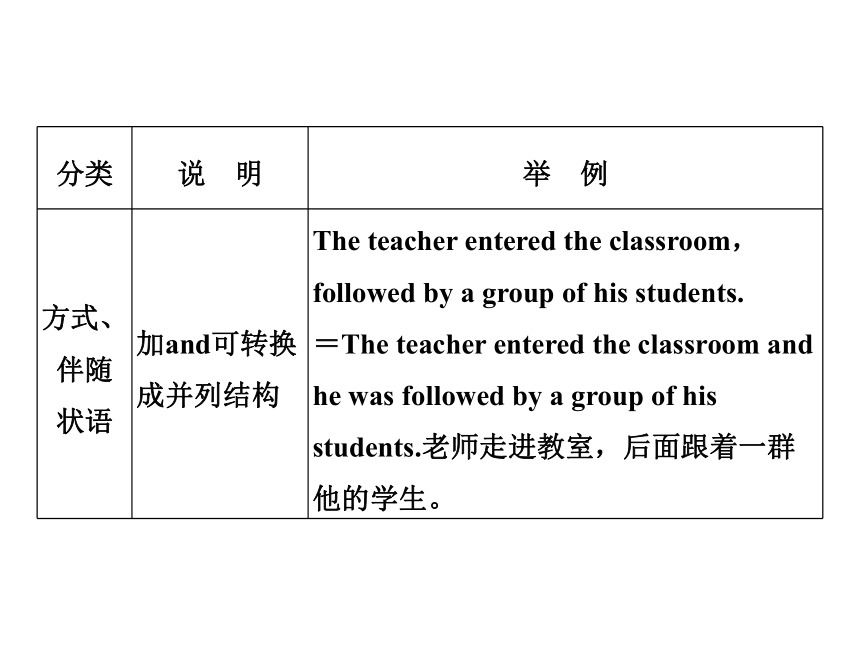
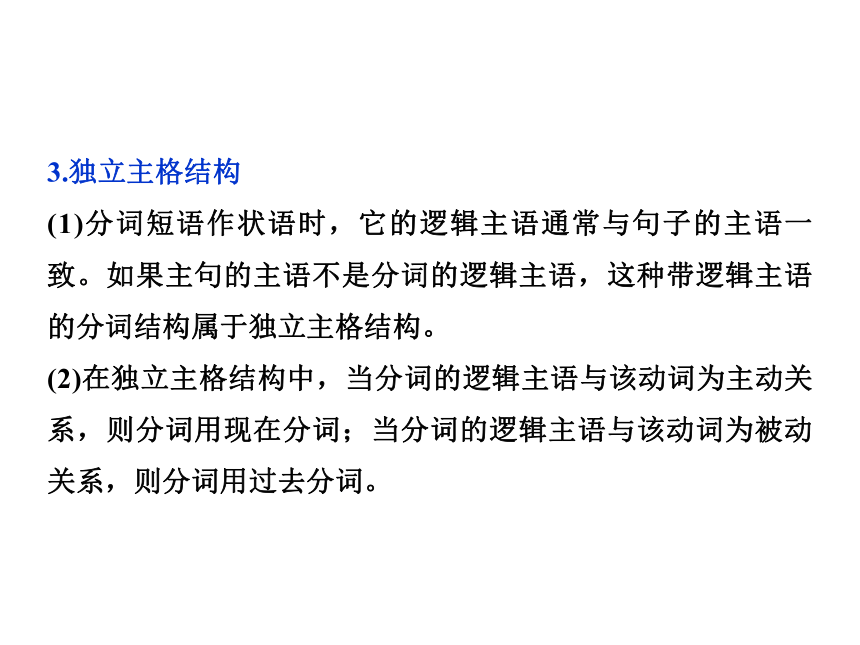
文档简介
课件47张PPT。Section Ⅳ Grammar & WritingUnit 13 People过去分词和情态动词
一、过去分词
分词是动词的一种非谓语形式,主要起形容词和副词的作用,可以作定语、表语或状语等。分词有两种,一种是现在分词,一种是过去分词。
过去分词有两大特点:一是表示被动的概念;二是表示已完成的动作。过去分词在句中可用作定语、表语、宾语补足语或状语等成分。过去分词在句中作某种成分时,其逻辑主语一般为该分词所表示的动作的承受者。1.过去分词的定语和表语功能2.过去分词或过去分词短语常作以下几种状语3.独立主格结构
(1)分词短语作状语时,它的逻辑主语通常与句子的主语一致。如果主句的主语不是分词的逻辑主语,这种带逻辑主语的分词结构属于独立主格结构。
(2)在独立主格结构中,当分词的逻辑主语与该动词为主动关系,则分词用现在分词;当分词的逻辑主语与该动词为被动关系,则分词用过去分词。Many things compared with you,I still have a long way to go.
许多东西跟你比起来,我还差得很远呢。
Time permitting, we will go to the seaside.
时间允许的话,我们就去海边。情态动词must表推测时,应根据句子具体的时态来完成其反意疑问句。
Tom must be sleeping now,isn’t he?
汤姆现在一定在睡觉,对吗?
From his accent,he must come from Guangdong,doesn’t he?
从他的口音判断,他肯定来自广东,对吗?
They must have arrived in London last week,didn’t they?
他们上周一定到达伦敦了,对吗?
He must have finished his homework by now,hasn’t he?
他现在肯定已经完成家庭作业了,对吗?在否定推测中用can’t或couldn’t,can’t have done和couldn’t have done在时间上没有区别,只是语气上有差别。
5.几组表推测的情态动词的用法
“情态动词+完成式”是历年高考的热点,在学习此类用法时,既需要掌握这一结构的基本用法,又必须仔细体会题干所提供的语言信息,准确理解语言环境和说话人的含义,尤其要注意题干中时态给予的暗示。(1)must have done表示对已经发生的事情的推测,意为“一定,想必”,句子中表示的是一种肯定的推测。这种结构一般只用于肯定句,其否定形式是can’t/couldn’t have done,表示“不可能,肯定不会”。
He didn’t hear the phone.He must have been asleep.
他没有听到电话响。他肯定是已经睡着了。
He must have been to Shanghai.
他一定去过上海。
They can’t have gone out,because the light is on.
他们不可能出去,因为灯亮着。(2)can/could have done表示对过去的时间内可能发生的事情的猜测,can have done一般只用于否定句和疑问句;could have done还可以用于肯定句,常用来表示本来可能完成而实际未完成的动作。
He can’t have finished the work so soon.
这项工作他不可能完成得这样快。We could have walked to the station,because it was so near.我们本来是可以走到车站去的,因为路很近。
—There were already five people in the car,but they managed to take me as well.
——车内早已有五个人了,可他们还是设法把我也拉上了。
—It couldn’t have been a comfortable journey.
——那不大可能是次舒适的旅行。(推测过去,把握较大)(3)may/might have done表示对已经发生的事情的不太肯定的推测,意为“可能已经,或许已经”。而虚拟用法表示本可以做,但却没做(表示很委屈的责备)。
If we had taken the other road,we might have arrived earlier.如果我们选择另一条路,我们可能会到得早一些。
He can speak English very fluently.He may have studied English abroad.
他能讲非常流利的英语。他也许在国外学习过英语。(推测过去,把握不太大)(4)should/ought to have done指本该做而实际未做,意为“本来应该”。其否定式shouldn’t/oughtn’t to have done则表示某种行为不该发生但发生了,含有责备或后悔之意。
You should have started earlier,but you didn’t.
你本应该早一点出发,但是你没有。
We shouldn’t have waited for her because she never came.我们本不应该等她,因为她根本不会来。(5)would have done 表示本想做(但没做);wouldn’t have done表示本不想做(但做了)。常用于虚拟条件句或含虚拟条件引导的虚拟语气句,表示对过去所发生事情的结果的假设。
I would have helped you,but I was too busy.
我本想帮你,但我太忙了。
在将带有情态动词表示推测的陈述句变成反意疑问句时,后面的附加疑问句一般不再使用情态动词,而要根据句子的时态以及陈述句中的时间状语,正确选用助动词。You must have watched that football match last night,didn’t you?
你昨晚一定看那场足球赛了,是吗?(陈述句后有具体的时间状语last night,因而反意疑问句用didn’t you)
You must have finished your homework,haven’t you?
你一定已经完成你的家庭作业了,是吗?(陈述句后没有具体的时间状语,反意疑问句用haven’t you)1.He found his phone ____________ (disconnect) as he didn’t pay his bill.
2.Have you noticed classical music usually ____________ (play) by TV commercials for luxury cars?disconnectedplayedⅠ 单句语法填空3.The car turned away,_______ (head) for the countryside.
4.____________ (recognize) as a man of many talents,the young man has a promising future.
5.The old man looked very pleased to see his apartment beautifully ____________ (decorate).headingRecognizeddecorated6.Ways must be found to deal with the constant noise ____________ (cause) serious health problems.
7.Can those ____________ (seat) at the back of the classroom hear me?
8.We must have our windows ____________ (repair) before winter comes,or we’ll freeze.
9.____________ (shock) at the terrible working conditions,we decided to quit the job.
10.The flight ____________ (delay) by the storm is for Xiamen.causingseatedrepairedShockeddelayedⅡ 单句改错
1.You should have helped him out, but you haven’t.
_____________________
2.She looks so happy. She need have passed the driving test.____________
3.When she was very young, she can ride a bike._________
4.I have to go now. My mother must waiting for me.____________
5.She was very angry. She must known the whole truth.____________haven’t→didn’tneed→mustcan→couldmust后加bemust后加haveⅢ 完成句子
1.此事肯定是他干的,因为房间里没有别人。
He _______________it,for there was no one else in the room.
2.事故可能会发生在醉酒的司机身上。
Accidents ___________________any drunken drivers.
3.汤姆没来,他可能是病了。
Tom is absent. He ____________.
4.她通常起得很早,她不可能错过汽车。
She usually gets up very early. She ____________the bus.must have done can happen tomay be illcan’t miss5.电脑不工作了,肯定是出毛病了。
The computer doesn’t work. There ____________something wrong with it.
6.灯亮着,我们昨晚一定是忘了关了。
The light is on. We ____________________to turn it off last night.
7.约翰看上去很难过,他可能没有通过考试。
John looks so sad. He __________________________the exam.must be must have forgottenmay/might not have passed8.他不可能在宿舍里睡觉,我刚才看见他了。
He ______________________in the dormitory. I saw him just now.
9.昨天你没必要向他道歉的。
You __________________________________yesterday.
10.他现在应该是在准备,20分钟后他就要考试了。
He _______________________now. He is taking the exam in 20 minutes.can’t be sleeping needn’t have apologized to himought to be preparing如何描写人物 文体感知
一篇人物描写记叙文,应注意以下几个方面的问题:
1.交代清楚人物(who/whom)、时间(when)、地点(where)、事由(what)等简要背景情况。2.层次条理、分明。记叙时,要有开头段、主体段及结尾段。人物描写通常从人物的面貌、性格、行为等特点入手,在描写时要将最有意义、最能表现人物思想性格的行动作为写作素材,写出特色和个性。
3.注意时态。通常事件发生的时间是确定时态的关键。叙述经常性的事情时,以一般现在时为主;讲述过去的事件和行为时,以一般过去时为主。
4.人物描写的种类:①人物外貌描写;②语言行动描写;③心理活动描写;④贡献和成就介绍。
5.人物描写的主要内容:
集中各主要人物的描写,记叙人物遇到的事情及对人物的影响。6.人物描写的方法:
抓住人物的明显特征,根据需要可以包括身材、头发、脸形、皮肤、衣着、年龄等,但也不需要面面俱到;有时候根据需要,也可以描写人物的个性、习惯、行为、职业、爱好或经历等。
7.人物描写应注意以下几点:
(1)明确描写的目的,描写只起修饰作用;
(2)围绕主题,选好描写的细节;
(3)抓住人物的特点,努力运用生动形象的语言,注意动词、形容词、副词等的变换,同义表达的运用等;
(4)充分发挥联想能力,恰当地运用修辞方法。 增分佳句
1.Charle Chaplin is considered...
2.He was born...
3.At the age of..., he...
4.As early as...,...
5.He had...hair and...eyes.
6.Joe Hill was a ... man.7.She was a young woman who...
8.He became famous for...
9.We regard...as our model.
10.People spoke highly of her and all respected her.
11.She is fond of...
12.He was interested in… 写作要求
根据以下提示,写一篇介绍艾丽丝·门罗的文章,要求词数100左右。 审题谋篇 词句推敲
1.词汇
①出生于…… __________________
②赢得2013年诺贝尔文学奖
___________________________________
③三次 __________________
④短篇小说集 __________________________
⑤例如 ____________
⑥与……相比 ________________win the 2013 Nobel Prize in Literaturebe born on/inthree timescollections of short storiessuch asbe compared to2.句式
①加拿大女作家艾丽丝·门罗——“当代短篇文学小说大师”,荣获2013年诺贝尔文学奖,她出生于1931年7月10日。
一般表达:
Canada’s woman writer Alice Munro won the 2013 Nobel Prize in Literature.She was called “master of the contemporary short story of literature”and she was born on July 10th,1931.
高级表达:(使用定语从句)
_______________________________________________________________________________________________________________________________________________________________Canada’s woman writer Alice Munro,called “master of the contemporary short story of literature”,who was born on July 10th,1931,won the 2013 Nobel Prize in Literature.②至2013年她共创作11部短篇小说集和1部类似故事集的长篇小说,如《你以为你是谁啊?》和《快乐影子之舞》。
一般表达:
She wrote eleven collections of short stories and one novel similar to a collection of stories.She wrote Who Do You Think You Are? and Dance of the Happy Shades.
高级表达:(使用in all,such as连接句子)
_______________________________________________________________________________________________________________________________________________________________In all,she wrote eleven collections of short stories and one novel similar to a collection of stories,such as Who Do You Think You Are? And Dance of the Happy Shades.③她是第一位加拿大籍荣获文学奖的作家,被比作俄罗斯的Anton Chekhov。
一般表达:
She’s the first Canadian-based writer to win the literature award.She was compared to Russian Anton Chekhov.
高级表达:(使用定语从句)
________________________________________________________________________________________________________She’s the first Canadian-based writer to win the literature award,who was compared to Russian Anton Chekhov. 妙笔成篇_______________________________________________________________________________________________________________________________________________________________________________________________________________________________________________________________________________________________________________________________________________________________________________________________________________________________________One possible version:
Alice Munro
Canada’s woman writer Alice Munro,called “master of the contemporary short story of literature”,who was born on July 10th,1931,won the 2013 Nobel Prize in Literature.Munro is the 13th woman to receive the prize.
She has won Canada’s Governor General’s Literary Award three times.What’s more,she was granted the Man Booker International Prize in 2009.__________________________________________________________________________________________________________________________________________________________________________________________________________________________________________________________________________________________In all,she wrote eleven collections of short stories and one novel similar to a collection of stories,such as Who Do You Think You Are? and Dance of the Happy Shades.Most of the works that she wrote are about the usual life of women.
She’s the first Canadian-based writer to win the literature award,who was compared to Russian Anton Chekhov.
一、过去分词
分词是动词的一种非谓语形式,主要起形容词和副词的作用,可以作定语、表语或状语等。分词有两种,一种是现在分词,一种是过去分词。
过去分词有两大特点:一是表示被动的概念;二是表示已完成的动作。过去分词在句中可用作定语、表语、宾语补足语或状语等成分。过去分词在句中作某种成分时,其逻辑主语一般为该分词所表示的动作的承受者。1.过去分词的定语和表语功能2.过去分词或过去分词短语常作以下几种状语3.独立主格结构
(1)分词短语作状语时,它的逻辑主语通常与句子的主语一致。如果主句的主语不是分词的逻辑主语,这种带逻辑主语的分词结构属于独立主格结构。
(2)在独立主格结构中,当分词的逻辑主语与该动词为主动关系,则分词用现在分词;当分词的逻辑主语与该动词为被动关系,则分词用过去分词。Many things compared with you,I still have a long way to go.
许多东西跟你比起来,我还差得很远呢。
Time permitting, we will go to the seaside.
时间允许的话,我们就去海边。情态动词must表推测时,应根据句子具体的时态来完成其反意疑问句。
Tom must be sleeping now,isn’t he?
汤姆现在一定在睡觉,对吗?
From his accent,he must come from Guangdong,doesn’t he?
从他的口音判断,他肯定来自广东,对吗?
They must have arrived in London last week,didn’t they?
他们上周一定到达伦敦了,对吗?
He must have finished his homework by now,hasn’t he?
他现在肯定已经完成家庭作业了,对吗?在否定推测中用can’t或couldn’t,can’t have done和couldn’t have done在时间上没有区别,只是语气上有差别。
5.几组表推测的情态动词的用法
“情态动词+完成式”是历年高考的热点,在学习此类用法时,既需要掌握这一结构的基本用法,又必须仔细体会题干所提供的语言信息,准确理解语言环境和说话人的含义,尤其要注意题干中时态给予的暗示。(1)must have done表示对已经发生的事情的推测,意为“一定,想必”,句子中表示的是一种肯定的推测。这种结构一般只用于肯定句,其否定形式是can’t/couldn’t have done,表示“不可能,肯定不会”。
He didn’t hear the phone.He must have been asleep.
他没有听到电话响。他肯定是已经睡着了。
He must have been to Shanghai.
他一定去过上海。
They can’t have gone out,because the light is on.
他们不可能出去,因为灯亮着。(2)can/could have done表示对过去的时间内可能发生的事情的猜测,can have done一般只用于否定句和疑问句;could have done还可以用于肯定句,常用来表示本来可能完成而实际未完成的动作。
He can’t have finished the work so soon.
这项工作他不可能完成得这样快。We could have walked to the station,because it was so near.我们本来是可以走到车站去的,因为路很近。
—There were already five people in the car,but they managed to take me as well.
——车内早已有五个人了,可他们还是设法把我也拉上了。
—It couldn’t have been a comfortable journey.
——那不大可能是次舒适的旅行。(推测过去,把握较大)(3)may/might have done表示对已经发生的事情的不太肯定的推测,意为“可能已经,或许已经”。而虚拟用法表示本可以做,但却没做(表示很委屈的责备)。
If we had taken the other road,we might have arrived earlier.如果我们选择另一条路,我们可能会到得早一些。
He can speak English very fluently.He may have studied English abroad.
他能讲非常流利的英语。他也许在国外学习过英语。(推测过去,把握不太大)(4)should/ought to have done指本该做而实际未做,意为“本来应该”。其否定式shouldn’t/oughtn’t to have done则表示某种行为不该发生但发生了,含有责备或后悔之意。
You should have started earlier,but you didn’t.
你本应该早一点出发,但是你没有。
We shouldn’t have waited for her because she never came.我们本不应该等她,因为她根本不会来。(5)would have done 表示本想做(但没做);wouldn’t have done表示本不想做(但做了)。常用于虚拟条件句或含虚拟条件引导的虚拟语气句,表示对过去所发生事情的结果的假设。
I would have helped you,but I was too busy.
我本想帮你,但我太忙了。
在将带有情态动词表示推测的陈述句变成反意疑问句时,后面的附加疑问句一般不再使用情态动词,而要根据句子的时态以及陈述句中的时间状语,正确选用助动词。You must have watched that football match last night,didn’t you?
你昨晚一定看那场足球赛了,是吗?(陈述句后有具体的时间状语last night,因而反意疑问句用didn’t you)
You must have finished your homework,haven’t you?
你一定已经完成你的家庭作业了,是吗?(陈述句后没有具体的时间状语,反意疑问句用haven’t you)1.He found his phone ____________ (disconnect) as he didn’t pay his bill.
2.Have you noticed classical music usually ____________ (play) by TV commercials for luxury cars?disconnectedplayedⅠ 单句语法填空3.The car turned away,_______ (head) for the countryside.
4.____________ (recognize) as a man of many talents,the young man has a promising future.
5.The old man looked very pleased to see his apartment beautifully ____________ (decorate).headingRecognizeddecorated6.Ways must be found to deal with the constant noise ____________ (cause) serious health problems.
7.Can those ____________ (seat) at the back of the classroom hear me?
8.We must have our windows ____________ (repair) before winter comes,or we’ll freeze.
9.____________ (shock) at the terrible working conditions,we decided to quit the job.
10.The flight ____________ (delay) by the storm is for Xiamen.causingseatedrepairedShockeddelayedⅡ 单句改错
1.You should have helped him out, but you haven’t.
_____________________
2.She looks so happy. She need have passed the driving test.____________
3.When she was very young, she can ride a bike._________
4.I have to go now. My mother must waiting for me.____________
5.She was very angry. She must known the whole truth.____________haven’t→didn’tneed→mustcan→couldmust后加bemust后加haveⅢ 完成句子
1.此事肯定是他干的,因为房间里没有别人。
He _______________it,for there was no one else in the room.
2.事故可能会发生在醉酒的司机身上。
Accidents ___________________any drunken drivers.
3.汤姆没来,他可能是病了。
Tom is absent. He ____________.
4.她通常起得很早,她不可能错过汽车。
She usually gets up very early. She ____________the bus.must have done can happen tomay be illcan’t miss5.电脑不工作了,肯定是出毛病了。
The computer doesn’t work. There ____________something wrong with it.
6.灯亮着,我们昨晚一定是忘了关了。
The light is on. We ____________________to turn it off last night.
7.约翰看上去很难过,他可能没有通过考试。
John looks so sad. He __________________________the exam.must be must have forgottenmay/might not have passed8.他不可能在宿舍里睡觉,我刚才看见他了。
He ______________________in the dormitory. I saw him just now.
9.昨天你没必要向他道歉的。
You __________________________________yesterday.
10.他现在应该是在准备,20分钟后他就要考试了。
He _______________________now. He is taking the exam in 20 minutes.can’t be sleeping needn’t have apologized to himought to be preparing如何描写人物 文体感知
一篇人物描写记叙文,应注意以下几个方面的问题:
1.交代清楚人物(who/whom)、时间(when)、地点(where)、事由(what)等简要背景情况。2.层次条理、分明。记叙时,要有开头段、主体段及结尾段。人物描写通常从人物的面貌、性格、行为等特点入手,在描写时要将最有意义、最能表现人物思想性格的行动作为写作素材,写出特色和个性。
3.注意时态。通常事件发生的时间是确定时态的关键。叙述经常性的事情时,以一般现在时为主;讲述过去的事件和行为时,以一般过去时为主。
4.人物描写的种类:①人物外貌描写;②语言行动描写;③心理活动描写;④贡献和成就介绍。
5.人物描写的主要内容:
集中各主要人物的描写,记叙人物遇到的事情及对人物的影响。6.人物描写的方法:
抓住人物的明显特征,根据需要可以包括身材、头发、脸形、皮肤、衣着、年龄等,但也不需要面面俱到;有时候根据需要,也可以描写人物的个性、习惯、行为、职业、爱好或经历等。
7.人物描写应注意以下几点:
(1)明确描写的目的,描写只起修饰作用;
(2)围绕主题,选好描写的细节;
(3)抓住人物的特点,努力运用生动形象的语言,注意动词、形容词、副词等的变换,同义表达的运用等;
(4)充分发挥联想能力,恰当地运用修辞方法。 增分佳句
1.Charle Chaplin is considered...
2.He was born...
3.At the age of..., he...
4.As early as...,...
5.He had...hair and...eyes.
6.Joe Hill was a ... man.7.She was a young woman who...
8.He became famous for...
9.We regard...as our model.
10.People spoke highly of her and all respected her.
11.She is fond of...
12.He was interested in… 写作要求
根据以下提示,写一篇介绍艾丽丝·门罗的文章,要求词数100左右。 审题谋篇 词句推敲
1.词汇
①出生于…… __________________
②赢得2013年诺贝尔文学奖
___________________________________
③三次 __________________
④短篇小说集 __________________________
⑤例如 ____________
⑥与……相比 ________________win the 2013 Nobel Prize in Literaturebe born on/inthree timescollections of short storiessuch asbe compared to2.句式
①加拿大女作家艾丽丝·门罗——“当代短篇文学小说大师”,荣获2013年诺贝尔文学奖,她出生于1931年7月10日。
一般表达:
Canada’s woman writer Alice Munro won the 2013 Nobel Prize in Literature.She was called “master of the contemporary short story of literature”and she was born on July 10th,1931.
高级表达:(使用定语从句)
_______________________________________________________________________________________________________________________________________________________________Canada’s woman writer Alice Munro,called “master of the contemporary short story of literature”,who was born on July 10th,1931,won the 2013 Nobel Prize in Literature.②至2013年她共创作11部短篇小说集和1部类似故事集的长篇小说,如《你以为你是谁啊?》和《快乐影子之舞》。
一般表达:
She wrote eleven collections of short stories and one novel similar to a collection of stories.She wrote Who Do You Think You Are? and Dance of the Happy Shades.
高级表达:(使用in all,such as连接句子)
_______________________________________________________________________________________________________________________________________________________________In all,she wrote eleven collections of short stories and one novel similar to a collection of stories,such as Who Do You Think You Are? And Dance of the Happy Shades.③她是第一位加拿大籍荣获文学奖的作家,被比作俄罗斯的Anton Chekhov。
一般表达:
She’s the first Canadian-based writer to win the literature award.She was compared to Russian Anton Chekhov.
高级表达:(使用定语从句)
________________________________________________________________________________________________________She’s the first Canadian-based writer to win the literature award,who was compared to Russian Anton Chekhov. 妙笔成篇_______________________________________________________________________________________________________________________________________________________________________________________________________________________________________________________________________________________________________________________________________________________________________________________________________________________________________One possible version:
Alice Munro
Canada’s woman writer Alice Munro,called “master of the contemporary short story of literature”,who was born on July 10th,1931,won the 2013 Nobel Prize in Literature.Munro is the 13th woman to receive the prize.
She has won Canada’s Governor General’s Literary Award three times.What’s more,she was granted the Man Booker International Prize in 2009.__________________________________________________________________________________________________________________________________________________________________________________________________________________________________________________________________________________________In all,she wrote eleven collections of short stories and one novel similar to a collection of stories,such as Who Do You Think You Are? and Dance of the Happy Shades.Most of the works that she wrote are about the usual life of women.
She’s the first Canadian-based writer to win the literature award,who was compared to Russian Anton Chekhov.
